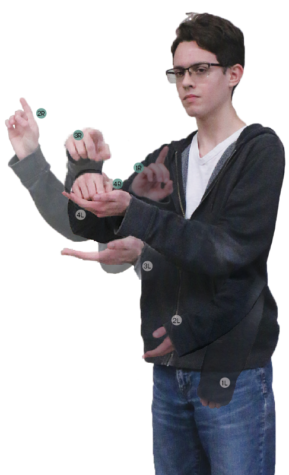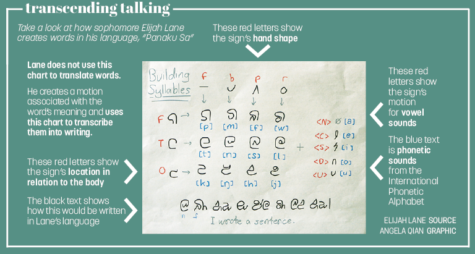What got you into this hobby?
I’m not exactly sure. At some point, I just began learning about languages and that sort of thing and I discovered constructed languages or “conlangs.” People like to call constructed languages fake, but they’re not fake. They’re real; they have grammar; they have an entire lexicon of words. Natural languages are languages like English, Spanish, Mandarin, most of the languages you’ve heard of in the world. Constructed languages haven’t evolved over time, and they are made intentionally. People usually see that has weird because why would you make a language if you already speak one? What would you use the language for? But it’s a really interesting hobby. It’s like writing a story or drawing or painting a painting. It’s almost an art form. Like an intellectual art form.
What is your inspiration for creating a new language?
The real reason I started making this language was because I had an idea. ASL (American Sign Language) is exclusively signed. You can only sign it. You might be able to transcribe it through illustrations, but it’s really just a signed language. In English, you can write it or speak it. There is no correlation between ASL and English. They’re different languages. That’s why you have to get interpreters who can understand both languages because they are different. So I wondered, “What if there’s a language that had a signed form that could be transcribed, not translated, into written form and spoken form, so it’s all one language.”
What’s the difference between your language and ASL?

ASL has existed for a few hundred years, maybe even longer, and it has a lot more history behind it. It’s definitely a lot more of a robust language. It has a lot of history, culture and lots of stuff behind it that you can’t really simulate. You can’t really have that purely authentic feel to a constructed language because, depending on how long you take to make it, usually you’re the only one speaking the language until you tell other people about it. You can’t really infuse a whole lot of culture into it because there’s no culture that is using the language to influence it and grow it and expand it and change it.
How do you think the world could benefit from this language?
The dream is that it would break down that barrier between deaf people and hearing people who don’t know how to sign because you need interpreters. Unless a hearing person knows sign language, you need an interpreter to interpret what the deaf person is signing. Because of different languages, it takes a lot of time and effort to learn a new language. It’s different from taking speech into writing, at least in many languages. In English, you have different symbols that represent different sounds so that if you hear what someone is saying, then you can write it down. So I wanted to apply that concept to signing. It would remove that barrier between deaf people and hearing people, and I think it would also be useful for everyone.
Why did you decide to come up with that language?
Prior to discovering constructed languages, or conlangs, as they’re called for short, I was just really interested in languages. I have no idea why. I found it fascinating how different all the world languages are and how they work, and then I came across the fact that lots of people actually put together their own languages from scratch and with inspiration based off other languages. I decided to take certain linguistic structures that I preferred and (put them) all together into one language that’s just a personal language. I’m not planning on taking over the world and making everyone speak this, for now. Really, I’m just doing it for fun.
What are some of your obstacles while making this language?
I think that the biggest obstacle for me right now is having the time, patience and creativity to come up with new words, because it’s kind of hard. You can only have so many combinations of the different signs, and so I kind of have to be creative and do the most with what little I have. Sometimes some of the words are a stretch, and you can’t really look at it and tell what it means. For a lot of them, that’s my goal. How do I represent direct object with my hands? That’s hard to do. That’s one of my biggest challenges.
How many words do you plan to put in your language?
Too many to count. Languages are like living, organic beings. They evolve. Like, what is a word? People, especially on the internet, coin new words all the time, and whether or not they stick around, they are still words. People hear them and then understand their meaning and they can use them in a sentence in a number of ways. That’s basically what a word is. In this language, I can keep making words until I have a hard time trying to think of words that should be in it. There’s no particular end for that.


































![AI in films like "The Brutalist" is convenient, but shouldn’t take priority [opinion]](https://hilite.org/wp-content/uploads/2025/02/catherine-cover-1200x471.jpg)









































![Review: “The Immortal Soul Salvage Yard:” A criminally underrated poetry collection [MUSE]](https://hilite.org/wp-content/uploads/2025/03/71cju6TvqmL._AC_UF10001000_QL80_.jpg)
![Review: "Dog Man" is Unapologetically Chaotic [MUSE]](https://hilite.org/wp-content/uploads/2025/03/dogman-1200x700.jpg)
![Review: "Ne Zha 2": The WeChat family reunion I didn’t know I needed [MUSE]](https://hilite.org/wp-content/uploads/2025/03/unnamed-4.png)
![Review in Print: Maripaz Villar brings a delightfully unique style to the world of WEBTOON [MUSE]](https://hilite.org/wp-content/uploads/2023/12/maripazcover-1200x960.jpg)
![Review: “The Sword of Kaigen” is a masterpiece [MUSE]](https://hilite.org/wp-content/uploads/2023/11/Screenshot-2023-11-26-201051.png)
![Review: Gateron Oil Kings, great linear switches, okay price [MUSE]](https://hilite.org/wp-content/uploads/2023/11/Screenshot-2023-11-26-200553.png)
![Review: “A Haunting in Venice” is a significant improvement from other Agatha Christie adaptations [MUSE]](https://hilite.org/wp-content/uploads/2023/11/e7ee2938a6d422669771bce6d8088521.jpg)
![Review: A Thanksgiving story from elementary school, still just as interesting [MUSE]](https://hilite.org/wp-content/uploads/2023/11/Screenshot-2023-11-26-195514-987x1200.png)
![Review: "When I Fly Towards You", cute, uplifting youth drama [MUSE]](https://hilite.org/wp-content/uploads/2023/09/When-I-Fly-Towards-You-Chinese-drama.png)
![Postcards from Muse: Hawaii Travel Diary [MUSE]](https://hilite.org/wp-content/uploads/2023/09/My-project-1-1200x1200.jpg)
![Review: "Ladybug & Cat Noir: The Movie," departure from original show [MUSE]](https://hilite.org/wp-content/uploads/2023/09/Ladybug__Cat_Noir_-_The_Movie_poster.jpg)
![Review in Print: "Hidden Love" is the cute, uplifting drama everyone needs [MUSE]](https://hilite.org/wp-content/uploads/2023/09/hiddenlovecover-e1693597208225-1030x1200.png)
![Review in Print: "Heartstopper" is the heartwarming queer romance we all need [MUSE]](https://hilite.org/wp-content/uploads/2023/08/museheartstoppercover-1200x654.png)




Maria Antonieta Soto • Nov 18, 2019 at 7:25 pm
Congratulations to Elijah Lane!
How ingenious and creative!
Keep up the great work!